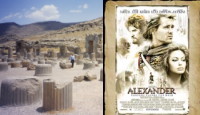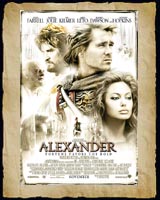
Photo. The Hall of the Hundred Columns in Persepolis,
Iran (on the left side), and the cover from the movie about Alexander the Great
(on the right side).
The person on
the photo is the author exploring the remains of this ancient wonder.
Alexander the Great, or
not
Great?
I really wonder;
is it correctly to call Alexander a great person? "Great" is defined in the
dictionary as being powerful, superior in quality or character, distinguished
and even aristocratic. So according to this definition it would be better to
find another name on him. He was definitely not peaceful! Just look
at the dramatic scenes from the film available for viewing below.
There is no doubt that Alexander was an extraordinary person. He was
both a genious, powersick and crazy
person in general. He was extremely powerful and had an incredible large
empire, probably the largest empire which has ever been. However, like every
rose has its thorn, so did Alexander, especially when it comes to
Persepolis in
Iran.
The amazing
story about Persepolis begun for
2500 years ago. At that time life flourished and the empire grow. It was
believed that it was inaccessible, but so came Alexander the Great
.Since
Persepolis was in the
heartland, no one expected that it
would show up enemies there. It was probably therefore
Persepolis lacked
strong fortifications. Persepolis
continued to flourish under the later Achaemenian Kings, until it was destroyed
by Alexander the Great in 330 B.C. Alexander and his soldiers stormed and break
trough Persepolis from the
northeastern corner where the mountain and the platform meet.
After Alexander the Great had plundered and burned Persepoilis,
the city was abandoned.
|
********************************
Advertising
******************************* |
Contact us in Travel Explorations for
booking your tour to Iran.
E-mail: Stein@TravelExplorations.com
Soon we will introduce our partner in
Iran! |
Burning of
Persepolis by
Alexander the Great (Diodorus, The History of the world, 17.20-22), translated
by M.M. Austen, referred from the website http://irantarikh.com/persia/burning.htm.
As for Persepolis, the
capital of the Persian kingdom, Alexander described it to the Macedonians as
their worst enemy among the cities of Asia, and he gave it over to the
soldiers to plunder, with the exception of the royal palace.
It was the
wealthiest city under the sun and the private houses had been filled for a long
time with riches of every kind. The Macedonians rushed into it, killing all the
men and plundering the houses, which were numerous and full of furniture and
precious objects of every kind. Here much silver was carried off and
no little gold, and many expensive dresses, embroidered with purple or
with gold, fell as prizes to the victors.
But the great
royal palace, famed throughout the inhabited world, had been condemned to the
indignity of total destruction. The Macedonians spent the whole day in pillage
but still could not satisfy their
inexhaustible greed. [...] As for the women, they dragged them away forcibly
with their jewels, treating as slaves the whole group of captives. As
Persepolis had
surpassed all other cities in prosperity, so she now exceeded them in misfortune.
Alexander went
up to the citadel and took possession of the treasures stored there. They were
full of gold and silver, with the accumulation of revenue from Cyrus, the first
king of the Persians, down to that time. Reckoning gold in terms of silver,
2,500 tons were found there. Alexander wanted to take part of the money with
him, for the expenses of war and to deposit the rest at
Susa under close
guard. From Babylon,
Mesopotamia and Susa, he sent for a
crowd of mules, partly pack and partly draught animals, as well as 3,000 pack
camels, and with these he had all the treasure conveyed to the chosen places. He
was very hostile to the local people and did not trust them, and wished
to destroy Persepolis utterly. [...]
|
See the movie clip
here - incredible dramatic
scenes
See the
trailer from the coming movie about Alexander the Great (from the Official
Website for the movie): Movie -
Alexander. |
 |
Excavation of the Persepolis
site began in 1931, supervised by James Henry Breasted of the University of
Chicago's Oriental Institute. It`s still a magnificient wonder to admire for
explorers and adventure travellers.
More great stories and
discoveries in Iran:
Read more
about discoveries from ancient time in
Persia (Iran):
Iranian Cultural
Heritage News Agency (CHN): http://www.chn.ir/english.
Cyrus the Great, King of
Babylon and King of the
Land
Cyrus (580-529
BC) was the first Achaemenid Emperor. He founded
Persia by
uniting the two original Iranian Tribes- the Medes and the Persians. Although he
was known to be a great conqueror, who at one point controlled one of the
greatest Empires ever seen, he is best remembered for his unprecedented
tolerance and magnanimous attitude towards those he defeated.Read more on http://www.chn.ir/english/eshownews.asp?no=3902
Iranian Calendar Systems,
history and origins
The first
calendars based on Zoroastrian cosmology appeared during the later Achaemenian
period and though they have evolved and changed over the centuries the names of
the months have remained more or less the same till now. Before this period Old
Persian inscriptions and tablets indicate that early Iranians used a 360-day
calendar based on Babylonian system modified according to their own beliefs with
their own name days.
Month was
divided into two or three divisions depending on the phases of the moon. Twelve
months were named for various festivals or activities of the pastoral year with
30 days in each month. A thirteenth month every six years was added to keep the
360-day calendar in harmony with the seasons. Under the unified empire of the
Achaemenid it was necessary to create a distinctive Iranian calendar based on
Zoroastrian beliefs
Read more on http://www.chn.ir/english/eshownews.asp?no=3708
Cultural Anthropology of
Baluchis in Iran
For a curious
visitor who arrives in Baluchistan, the first
interesting issue that attracts the attention most is the way Baluchis are
dressed up. Baluchi people have preserved their way of clothing with a slight
change.
Men wear long
shirts, loose pants and a turban around their heads while women put on loose
dress and pants with needle works that are special of the people of the area and
is not common in other parts of the country. The upper part of the dress
and sleeves are decorated with needle works, an artistic work that is specific
of the clothing of the women Baluchis. They cover their hair with a scarf that
is called `Sarig' in the local dialect and wear `chador' over it.
Baluchi women
usually put on gold ornaments such as necklace and bracelet but their special
jewellery is `Dorr' or heavy earrings that are fastened to the head with gold
chains so that their heavy weight will not cause the tearing of the
ear. They usually wear a gold brooch called `Tasni' that are made by local
jewellers in various shapes and are used to fasten the two parts of the dress
over the chest. Read more on http://www.chn.ir/english/eshownews.asp?no=3845.
Iran is one of the most interesting and exciting countries in
the world for explorations and adventures. We in Travel
Explorations
will continuously follow all the great discoveries
there, and provide you with more news and articles.
Stein Morten
Lund, 13 November
2004
Additional
information
Travel
Explorations is designed for travel companies to increase their sales to
customer by utilizing the power of the Internet. Based on agreement, Travel
Explorations offer travel companies to keep their customers continuously updated
with tour programmes, price offers and more.
Bookings -
presentation of our partner in
Iran:
Coming soon! In
the mean time we give you exciting travel information based on own experiences
and a wide range of reliable sources. You are also welcome to contact us for
tour suggestions, prices and advise on e-mail stein@TravelExploratins.com.
Official website
for the movie about Alexander the Great: http://alexanderthemovie.warnerbros.com.
Read more
about discoveries from ancient time in
Persia (Iran):
Iranian Cultural
Heritage News Agency (CHN): http://www.chn.ir/english.
